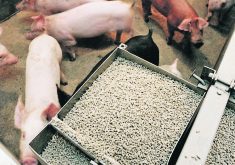House of Commons agriculture committee told that closure of Olymel plant will affect thousands of farmers and workers
The owners of the Quebec pork plant set to close by the end of this year said governments should help affected producers.
Sollio Co-operative Group owns Olymel, which last month announced its processing plant in Vallee Jonction will close. Many of the nearly 1,000 affected employees are foreign workers who must now apply for new work permits.
Stephane Forget, Olymel’s senior vice-president of public affairs, said the Quebec pork industry is facing the direst economic situation in its history. He told the standing agriculture committee that processors are trying to hold their own while feed costs and interest rates are rising.
Read Also

Canola oil transloading facility opens
DP World just opened its new canola oil transload facility at the Port of Vancouver. It can ship one million tonnes of the commodity per year.
“Olymel is not happy about having to make such a bold decision to ensure its profitability and its ability to play an active role in the value chain,” he said.
He said a compensation program similar to two previous programs could help the industry get through this period. He cited the Hog Farm Transition Program and the Hog Industry Loan Loss Reserve Program as models for a new plan.
Olymel’s first vice-president Paul Beauchamp said the company had to choose to either review its business plan or die after losses of more than $400 million in the last two years because of international market issues.
After reviewing the business, “we realized that the factory in Vallee Jonction was, in fact, the most difficult to keep running,” he said.
Although it is key for Quebec and Ontario producers, Beauchamp said one plant had to close and that was it.
“Choosing this factory was not done because we were negotiating with pork farmers in Quebec,” Beauchamp said. Instead, he said, it was chosen to minimize impacts on producers.
He said Olymel is going to focus on adding value for products in Japan and South Korea while selling fresh meat products locally.
This is how the company will protect itself from global volatility and the cyclical nature of the pork industry, he said.
Canadian Pork Council chair Rene Roy told the committee that the plant closure could reduce pork production in Canada by 12 percent, mostly in Eastern Canada.
But he said there will be a ripple effect across the country.
“To that end, we will be seeking federal government support to our farmers so they can still be farmers when this temporary turn down has ended,” he said.
He said Canada needs a national pork strategy and a national agriculture policy, as well as a more aggressive stance on trade agreements.
“Our sector is shut out of markets like Europe where we have trade agreements because we accept non-tariff trade barriers,” he said.
He later said if other countries can impose non-tariff barriers, then Canada should too.
David Duval, president of Quebec’s pork producers association, said there are 1,600 hog farms and 2,500 producers in the province. Of those, 32 percent are women and 25 percent are under age 40.
He outlined how consolidation has taken place in the province’s pork processing sector and suggested the committee should have asked the Competition Bureau why it approved the mergers and acquisitions.
“There’s a crying lack of liquidity in Quebec’s pork business and it’s time for both levels of government to help us,” he said through an interpreter. “Right now, for every hog we sell in Quebec we lose an average of $50.”
The Quebec government has offered some assistance and Duval agreed with the request for help from Ottawa.
“A few weeks ago there were two suicides,” he said, referring to the stress on producers.
It’s critical that the federal government help producers who are staying in business, he added, because they are often younger producers with high debt levels.
Ontario pork board member Eric Schwindt said 25,000 market hogs went to the Quebec Olymel plant from Ontario each week. This represents 23 percent, added.
About 5,000 feeder pigs will be displaced, he said, and Ontario is short about 25,000 hook spaces. Producers are looking at longer transport distances to Manitoba or south to the United States.
There are animal welfare, environmental and cost implications to that, which Schwindt estimated at $25 per hog.
“For me, I was marketing 10,000 pigs per year to Olymel in the past. That’s $250,000 per year net impact if I didn’t make changes to my farm operation,” he said.
He added that shipping to Manitoba or Red Deer, Alta., is hard on animals and there aren’t enough trucks or drivers.
NDP agriculture critic Alistair MacGregor said it’s interesting that producers want more capacity while Olymel said it is facing too many challenges to keep a plant operating.
Canada’s Indo-Pacific strategy offers many potential markets but only if there is a processing capability and plan to get pork there, the committee heard.
The committee held just one meeting on this issue and this week is crafting a letter to the federal minister of agriculture.


















